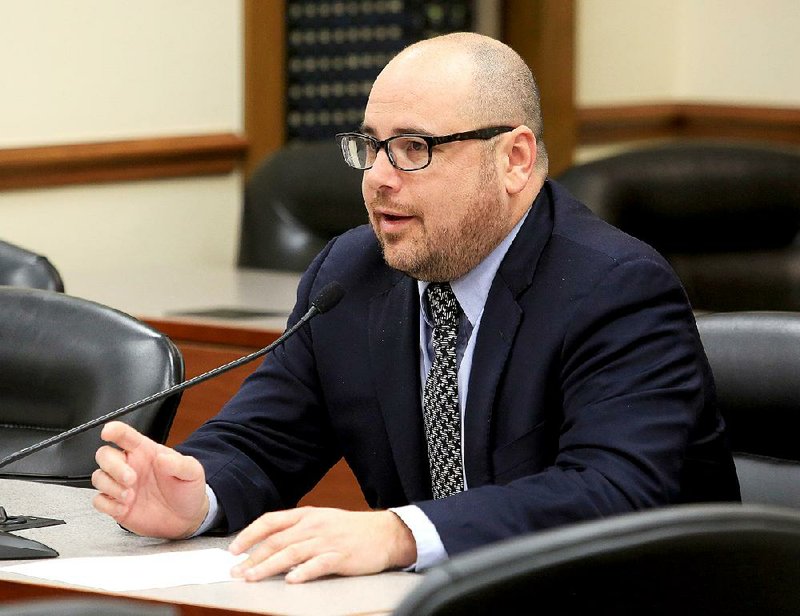An Arkansas Senate committee Wednesday endorsed legislation that would give Arkansas elected officials responsibility for approving a key pollution-control plan.
Another Senate committee recommended approval of a bill to bar the use of an unmanned vehicle or aircraft to surreptitiously take video or pictures of people in places where they would have a reasonable expectation of privacy. But it declined to approve legislation to allow concealed-weapon permit holders to store their weapons in the trunks of their vehicles while parked at work.
The Senate Public Health, Labor and Welfare Committee recommended approval of Senate Bill 183 by Sen. Eddie Joe Williams, R-Cabot, which would bar the state Department of Environmental Quality from submitting a state plan to the Environmental Protection Agency to cut carbon-dioxide emissions from coal-fired electricity generation plants until either the Legislative Council approves the plan or the governor directs the submission of a state plan.
The legislation also would prohibit the department from submitting a state plan to the EPA if the state plan results in "a significant rate increase annually for any rate class of the total delivered electricity cost per kilowatt per hour or of the total natural gas cost per thousand cubic feet," or "results in unreasonable reliability risks."
However, SB183 states that "submission of a state plan is the preferred method of compliance with the federal emission guidelines."
Williams told the Senate committee that his legislation is aimed at giving the Legislature a say in the state plan to comply with the EPA's proposed rule. The rule would require a 44 percent reduction in Arkansas' carbon-dioxide emissions by 2030.
Almost half of the state's electricity comes from coal-fired plants, he noted.
Ryan Benefield, interim director of the state Environmental Quality Department, said the department doesn't have a position on the legislation, but it already has submitted its detailed concerns with the proposed rule to the EPA. The department would have to spend between $300,000 and $700,000 to hire a consultant to conduct the studies required by the bill, he noted.
Glen Hooks, director of the state Sierra Club, suggested changing the bill to require state officials to study the positive effects on public health, air quality and increased jobs from the EPA's proposed rule.
A dozen states filed a lawsuit last year challenging the EPA's proposed rule. Arkansas Attorney General Leslie Rutledge filed a request on Feb. 12 to intervene in the lawsuit, but the request had not been granted as of Wednesday, said Rutledge spokesman Judd Deere.
DRONE LIMITS
The Senate Judiciary Committee advanced a bill that would bar the use of an unmanned vehicle or aircraft to take surreptitious video or pictures of a person that invade his privacy.
House Bill 1349, sponsored by Rep. Justin Harris, R-West Fork, would also prohibit the use of drones to enter a private residence or otherwise violate a person's privacy.
CONCEALED WEAPONS
In a 4-3 vote, the Senate Judiciary Committee balked at recommending approval of a bill that would allow concealed-weapon permit holders to store their weapons in the trunks of their vehicles while parked at work.
Sen. Jimmy Hickey, R-Texarkana, said he sponsored SB492 to allow Arkansans with concealed-carry permits to take their guns to and from home and not worry about breaking the law while keeping them in their vehicles.
The weapon would have to be stored in a locked container inside the trunk, and businesses would be liable for any litigation resulting from an incident involving the weapon.
Sen. Linda Chesterfield, D-Little Rock, said she worried that the bill would take away rights from a business owner who didn't want weapons on his property.
CONSERVATION TRANSFER
In a 34-0 vote, the Senate approved SB469 by Sen. Ronald Caldwell, R-Wynne, to transfer the administration of the fish and wildlife conservation program from the state Department of Education to the state Department of Rural Services.
In consultation with the state Game and Fish Commission, the Rural Services Department would be required to establish school education programs for fish and wildlife conservation.
The bill goes to the House.
FOUNDATION REPAIRS
In a an 18-5 vote, the Senate approved SB181 by Williams to regulate foundation-repair contracts.
Under the bill, a foundation-repair contract is enforceable by the initial homeowner and any subsequent owner of a single-family dwelling against a contractor for the time specified in the foundation-repair contract. A person, who fails to comply with the measure, would be guilty of a violation punishable by a fine of $100 for each day of noncompliance.
If a homeowner successfully sues, he can get damages, court costs and reasonable attorney's fees.
The bill goes to the House.
CLAIMS COMMISSION
In a 68-23 vote, the state House of Representatives sent to the governor SB59, which would mandate that the state's Claims Commission give legislators a summary of facts along with its ultimate ruling before legislators hear an appeal of a commission finding.
Sponsored by Sen. Jeremy Hutchinson, R-Little Rock, the bill drew criticism from members of the subcommittee that hears appeals from the commission, who said the bill would move the commission closer to becoming a judicial body.
Hutchinson said the bill would ensure that legislators hearing an appeal would be up to speed before the hearing.
DEATH BENEFITS FOR FIREFIGHTERS
The House State Agencies and Governmental Affairs Committee endorsed HB1274 by state Rep. Greg Leding, D-Fayetteville, which would provide death benefits of up to $150,000 to firefighters who die as a result of a type of cancer linked to higher occurrences in firefighters than in the general population.
The designated beneficiaries of firefighters already are eligible for the benefits if firefighters are killed in the line of duty. Leding's bill would extend the benefits to firefighters who, after Jan. 1, 2012, succumb to certain cancers, which Leding said would average about one case per year.
Information for this article was contributed by Noel Oman of the Arkansas Democrat-Gazette.
Metro on 02/26/2015


